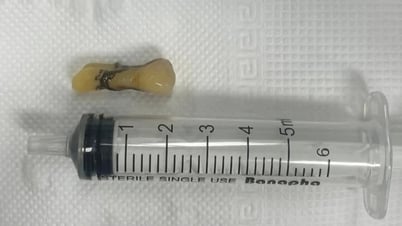
Causes of neck skin discoloration due to perfume
Dr Andrea Rachel, a consultant dermatologist at DermaZeal Clinic, Bangalore, India, emphasizes that although spraying perfume on the neck does not always cause changes in pigmentation, for some people, certain ingredients in perfumes such as bergamot essential oil, lemon essential oil and grapefruit essential oil contain bergapten and furocoumarins... which are photosensitizing substances.
“If applied or sprayed on the skin and exposed to sunlight, they can cause phytophotodermatitis. This irritates the skin and can lead to a darker skin discoloration called post-inflammatory hyperpigmentation,” says Dr. Andrea Rachel.
Additionally, repeated exposure to certain perfume ingredients such as cinnamates and fragrance blends can sensitize the immune system, leading to redness, rashes, and itching as part of allergic contact dermatitis.
Pigmented contact dermatitis is characterized by brown to black patches on the skin, often caused by cosmetics and perfumes.
Dr Chinjitha T Davis, a dermatologist at Manipal Hospital Goa, India, says: “Some ingredients in perfumes, such as alcohol and synthetic fragrances, can irritate the skin or cause allergic reactions. Chronic irritation or inflammation can trigger melanocytes to produce more melanin, resulting in darker patches. They can also cause autoimmune skin diseases.”
How to prevent
Dr. Andrea Rachel recommends spraying perfume and deodorant on clothes rather than directly on the skin. She recommends avoiding sun exposure and applying sunscreen to protect the skin from harmful UV rays.
Meanwhile, Dr Chinjitha T Davis recommends that naturally made deodorants and perfumes can reduce the risk of irritation and photosensitivity as they are often free of harmful chemicals and synthetic fragrances. However, it is important to ensure that these natural products do not contain any allergens or photosensitizing agents.
To treat discoloration, Dr. Rachel recommends temporarily stopping the use of fragrances that cause contact dermatitis, then using a prescription skin lightening cream to lighten post-inflammatory hyperpigmentation.
Note
“For people with atopic dermatitis or eczema, the skin barrier is already compromised. Using perfumes or even scented cosmetics can lead to contact dermatitis. It is best to use products that are completely fragrance-free,” advises Dr. Rachel.
Dr Chinjitha T Davis recommends creams containing ingredients such as kojic acid, alpha arbutin and niacinamide to help lighten hyperpigmented areas. She also warns against applying steroid creams or creams containing hydroquinone without medical advice as this can lead to localised side effects.
Source: https://laodong.vn/suc-khoe/nuoc-hoa-khien-da-co-sam-mau-bac-si-noi-gi-1384626.ldo

























































































![[OCOP REVIEW] Tu Duyen Syrup - The essence of herbs from the mountains and forests of Nhu Thanh](https://vphoto.vietnam.vn/thumb/402x226/vietnam/resource/IMAGE/2025/6/5/58ca32fce4ec44039e444fbfae7e75ec)







Comment (0)